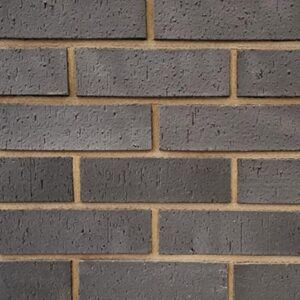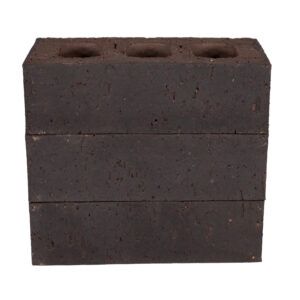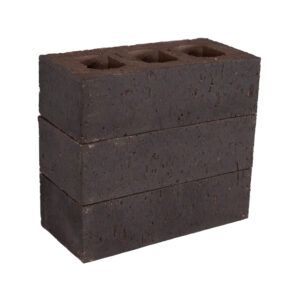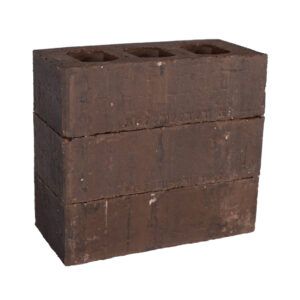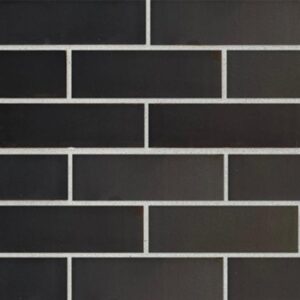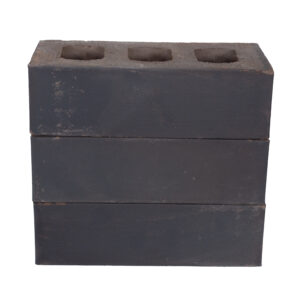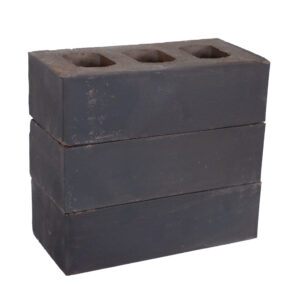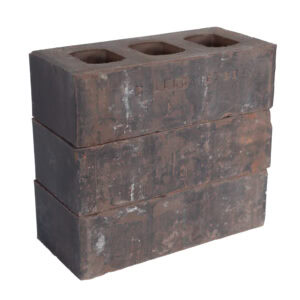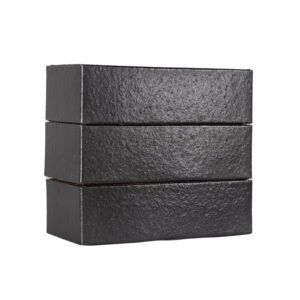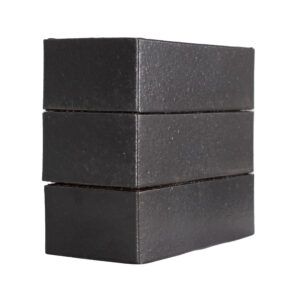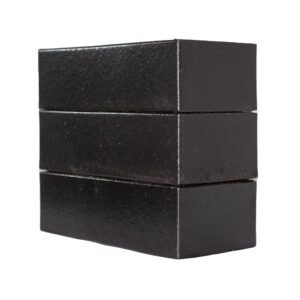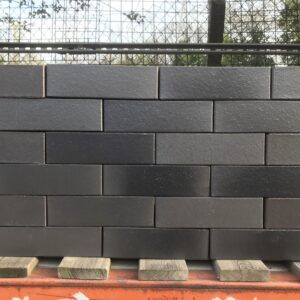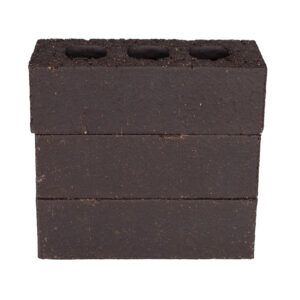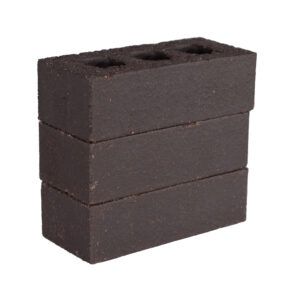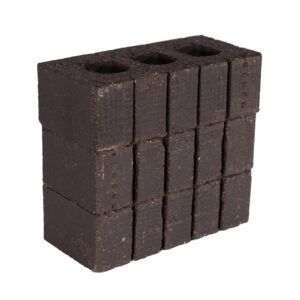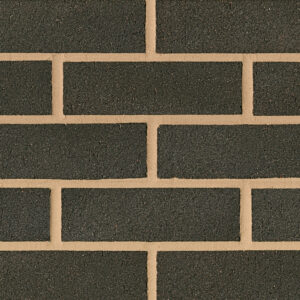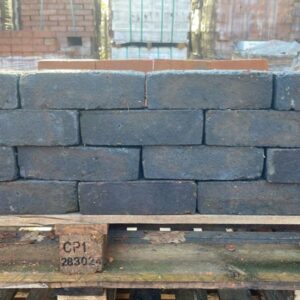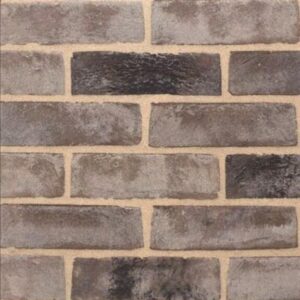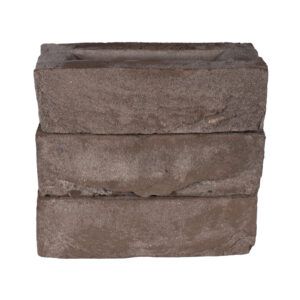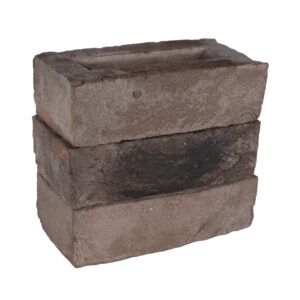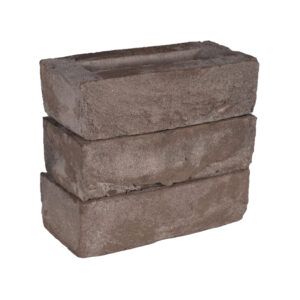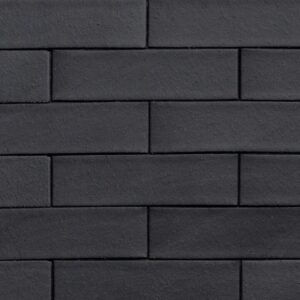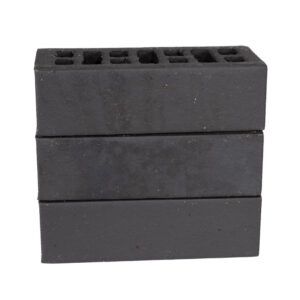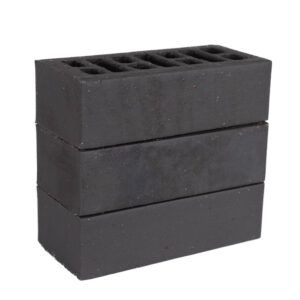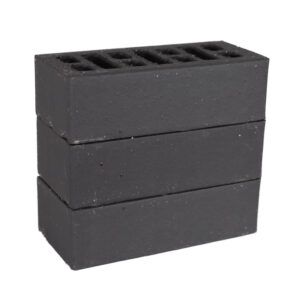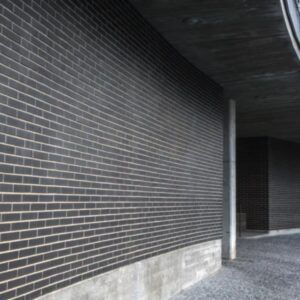Black Bricks
Nothing captures the imagination more than the architectural punch that is a black brick facade. The drama, durability, and versatility have seen the brick remain popular across UK construction sites. It is seen everywhere, from ultra-modern homes that want to evoke the alien look of the future, to commercial showpieces that want to exude luxury.
But black bricks are more than a design statement. What can they do for your build? Let’s find out.
Key Features of Black Bricks
There are several ways to achieve the dark brick colour. Manufacturers typically use the following methods:
- Firing in reduced atmospheres– Certain clay compositions produce a black or dark blue colour when fired in low oxygen conditions.
- Pigmentation– Certain additives, like manganese oxide, can be introduced to the mixture for a more uniform hue.
- Natural clay– Some places, like Staffordshire, in England, have clay soils known for their high iron marl content.
Products like MBH Blockleys Smooth Wirecut brick have proven their performance in demanding environments such as urban and coastal builds.
Benefits of Black Bricks
Density and Durability
Black bricks are typically rated F2 for frost resistance and S2 for soluble salts, with compressive strengths of up to 50 N/mm², ensuring they perform well in exterior walls.
Aesthetic Versatility
You can get a wide variety of finishes with black building bricks, including smooth, sharp lines, and stock (textured for a handmade look). This look fits in well with heritage, industrial, and ultra-modern builds. It also contrasts nicely with the brown hues of timber, concrete, or mortar.
Thermal Mass Efficiency
In the UK’s temperate climate, a black brick wall enhances a building’s heating efficiency by trapping heat during the day and releasing it at night. It also reduces energy demands in efficient systems.
Low Maintenance
While watermarks may be more visible on a black brick, they tend to resist showing stains better than lighter bricks.
What Are Black Bricks Used For?
Black is highly versatile and fits into many developments, including:
- Modern housing– The bricks create striking street-facing facades and can be integrated into gable ends. They are also perfect for rear extensions, especially with a contrasting design.
- Commercial developments– Black brick brings a quiet elegance to offices, galleries, and retail stores that want a sleek, high-end look.
- Architectural features– Black bricks can be used selectively for banding, window framing, or in landscape walls or entrances.
- Heritage projects– Black bricks blend perfectly with cream-coloured and red bricks to achieve a stunning Victorian or Gothic Revival look.
Why Choose Our Black Building Bricks?
At Brick Wholesale, we curate a collection that balances aesthetics, manufacturer reputation, performance, and value. Thousands of customers trust us to deliver:
- A wide product range– From the clean lines of the Basalte Black to the multicoloured look of Winerberger Pagus Grey/Black, we have what you need under one roof.
- A strong catalogue of manufacturers– We stock bricks from leading manufacturers like MBH PLC and Wienerberger to deliver better prices with bulk buy discounts.
- Nationwide– We deliver to any UK site within days of ordering.
- Expert support– Our sales team is composed of brick experts who stand ready to help you select the right brick and deliver information about your choices.
Find the right black bricks for sale for your project at Brick Wholesale and enjoy our bulk pricing.
CTA: Enjoy the luxurious elegance of black bricks that deliver. Build boldly with bulk pricing and premium manufacturers while stocks last!
FAQs
How are black bricks made?
Black bricks are made using additive pigments in the clay mixture before firing in a kiln. One of the most common pigments is black clay oxide, a ferric manganese umber stain.
Can you paint bricks black?
Yes, you can. There are special masonry varieties of paint you can use. One of the best is using an airless sprayer to lay down a coat of paint, and then work it into the pores with a roller.
Why are some bricks black?
It all depends on what kind of black they are. It could be because of the clay type, additives, firing in a low-oxygen atmosphere, glazing, paint, or simply soot buildup.
Showing all 9 results
-
Buy in Bulk & Save
1-4 5-9 10+ £491.56£589.87 £479.27£575.12 £466.98£560.38 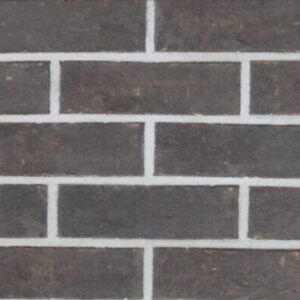 There are 2 more images
There are 2 more imagesET Clay Basalte Black Facing Brick Pack of 520
The Basalte Black brick is a perforated, wirecut facing brick, imported from the EU. It is black in colour with a light texture.
£491.56£589.87 Ex VATInc VAT£0.95£1.14 Per Brick Add to cart -
ET Clay Brisbane Black Dragwire Facing Brick Pack of 448
The Brisbane Black Dragwire brick is a perforated, wirecut facing brick, imported from the EU, that is black in colour with a light texture.
£398.75£478.50 Ex VATInc VAT£0.89£1.07 Per Brick Add to cart -
ET Clay Oliver Smooth Black Wirecut Brick Pack of 448
The Oliver Smooth Black brick is a perforated, wirecut facing brick, imported from the EU. It is black in colour with a smooth texture.
£395.08£474.10 Ex VATInc VAT£0.88£1.06 Per Brick Add to cart -
ET Clay Windermere Blue 65mm Wirecut Facing Brick Pack of 468
The Windermere Blue brick is a perforated, wirecut facing brick, imported from the EU, it is dark grey / blue in colour with a smooth texture. With its specifications, it can be used as an engineering brick.
£417.36£500.83 Ex VATInc VAT£0.89£1.07 Per Brick Add to cart -
Buy in Bulk & Save
1-4 5-9 10+ £384.12£460.94 £374.52£449.42 £364.91£437.89 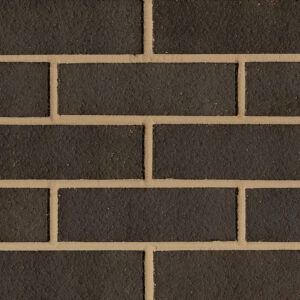 There are 2 more images
There are 2 more imagesMBH PLC Blockleys Black Smooth Wirecut Facing Brick Pack of 400
The Blockleys Black Smooth brick, manufactured by Michelmersh, is a perforated, wirecut facing brick that is black in colour with a smooth texture.
£384.12£460.94 Ex VATInc VAT£0.96£1.15 Per Brick Add to cart -
MBH PLC Blockleys Black Wirecut Facing Brick Pack of 400
The Blockleys Black brick, manufactured by Michelmersh, is a perforated, wirecut facing brick that is black in colour with a light texture.
£400.48£480.58 Ex VATInc VAT£1.00£1.20 Per Brick Add to cart -
Stock Clearance MBH PLC FLB Anthracite Stock Facing Brick Pack of 400
The FLB Anthracite brick, manufactured by Michelmersh, is stock, frogged facing brick that is anthracite in colour with slight blue hues and a light texture.
£294.40£353.28 Ex VATInc VAT£0.69£0.83 Per Brick Add to cart -
Buy in Bulk & Save
1-4 5-9 10+ £771.68£926.02 £752.39£902.87 £733.10£879.72 There are 2 more imagesWienerberger Pagus Grey/Black Stock Facing Brick Pack of 660
The Pagus Grey/Black Facing rick, manufactured by Wienerberger, is a stock, frogged facing brick that is grey / black / multi in colour with a heavy texture.
£771.68£926.02 Ex VATInc VAT£1.17£1.40 Per Brick Add to cart -
Buy in Bulk & Save
1-4 5-9 10+ £496.59£595.91 £484.18£581.02 £471.76£566.11 There are 1 more imagesLa Paloma Lanzarote Black Wirecut Facing Brick Pack of 512
The Lanzarote Black brick, manufactured by La Paloma, is a perforated, wirecut facing brick that is black in colour with a smooth texture.
£496.59£595.91 Ex VATInc VAT£0.97£1.16 Per Brick Get restock alert




